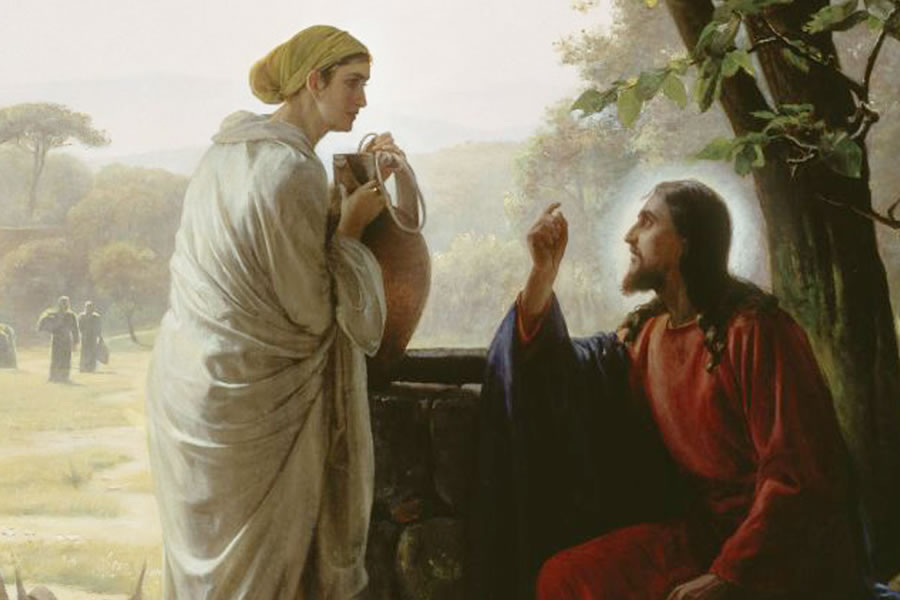
Striking the Rock
03-12-2023Weekly ReflectionDr. Scott HahnThe Israelites' hearts were hardened by their hardships in the desert. Though they saw His mighty deeds, in their thirst they grumble and put God to the test in today's First Reading - a crisis point recalled also in today's Psalm.
Jesus is thirsty too in today's Gospel. He thirsts for souls (see John 19:28). He longs to give the Samaritan woman the living waters that well up to eternal life. These waters couldn't be drawn from the well of Jacob, father of the Israelites and the Samaritans. But Jesus was something greater than Jacob (see Luke 11:31-32).
The Samaritans were Israelites who escaped exile when Assyria conquered the Northern Kingdom eight centuries before Christ (see 2 Kings 17:6, 24- 41). They were despised for intermarrying with non- Israelites and worshiping at Mount Gerazim, not Jerusalem. But Jesus tells the woman that the “hour” of true worship is coming, when all will worship God in Spirit and truth.
Jesus’ “hour” is the “appointed time” that Paul speaks of in today's Epistle. It is the hour when the Rock of our salvation was struck on the Cross. Struck by the soldier's lance, living waters flowed out from our Rock (see John 19:34-37). These waters are the Holy Spirit (see John 7:38-39), the gift of God (see Hebrews 6:4).
By the living waters the ancient enmities of Samaritans and Jews have been washed away, the dividing wall between Israel and the nations is broken down (see Ephesians 2:12-14, 18). Since His hour, all may drink of the Spirit in Baptism (see 1 Corinthians 12:13).
In this Eucharist, the Lord now is in our midst - as He was at the Rock of Horeb and at the well of Jacob. In the “today” of our Liturgy, He calls us to believe: “I am He,” come to pour out the love of God into our hearts through the Holy Spirit. How can we continue to worship as if we don't understand? How can our hearts remain hardened?
A service of the St. Paul Center for Biblical Theology www.SalvationHistory.com.
En su viaje hacia Galilea, Jesús se detiene al pie del monte Ebal, junto a Sicar, donde estaba el famoso pozo del patriarca Jacob, que era el orgullo de los samaritanos. Esta región formó parte del Reino del Norte de Israel. Tras caer en manos de los asirios (722 a. C.), la población terminó mezclándose con los paganos llevados allí. Tiempo después, el rey judío Juan Hircano destruyó el templo samaritano erigido en el Monte Garizim. Por eso, a pesar de su pasado común, la enemistad entre judíos y samaritanos era centenaria (cfr. 2 R 17,34-40).
Pero Jesús no tiene reparo en detenerse en Sicar. Cansado del camino y a la hora de comer, el Maestro envía a sus discípulos a buscar alimentos y se sienta junto al pozo a esperar. Es entonces cuando llega con su cántaro una samaritana, y se inicia un diálogo y un encuentro entre dos anhelos, simbolizados en el agua, y que se verán colmados: el anhelo divino de salvar a los hombres y la sed de Dios que hay en ellos.
“Recoged los ojos del alma y revivid despacio la escena –sugería san Josemaría−: (…) Es conmovedor observar al Maestro agotado. Además, tiene hambre: los discípulos han ido al pueblo vecino, para buscar algo de comer. Y tiene sed. Pero más que la fatiga del cuerpo, le consume la sed de almas. Por esto, al llegar la samaritana, aquella mujer pecadora, el corazón sacerdotal de Cristo se vuelca, diligente, para recuperar la oveja perdida: olvidando el cansancio, el hambre y la sed”.
“Dame de beber”: el antiguo recelo judío hacia los samaritanos, que les retraía incluso de hablarles y emplear sus utensilios, es quebrado por Jesús al pedir ayuda con modestia a la sorprendida samaritana que llega con su cántaro. Pero en realidad, era ella quien debería romper los prejuicios centenarios para pedir lo que Jesús da: un agua mejor que la del famoso pozo de Jacob, aunque ésta fuera muy abundante, pues sirvió para sus hijos e incluso sus ganados. La mujer entiende la insinuación de Jesús: que Él es mayor que Jacob y su pozo, y el agua que ofrece es maravillosa. La samaritana queda entonces prendada de la idea que se forja de esa agua y pasa a pedirla, para no tener nunca sed.
BACK TO LIST